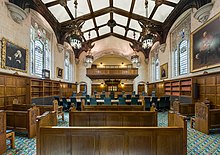UK Supreme Court rules prorogation of parliament unlawful
Tuesday, September 24, 2019

Image: Diliff.
Today at 10:30 BST (0930 UTC), the Supreme Court of the United Kingdom issued a ruling on the prorogation — a procedural suspension — of the Parliament of the United Kingdom until October 14. The court found that it could rule on the prorogation, and found the prorogation to be unlawful. The Supreme Court is the final court of appeal on all civil matters in the United Kingdom, as well as criminal matters in parts of the United Kingdom. The Supreme Court is led by President Brenda Hale.

Image: The White House via John Bolton.
The summary of the decision read in part: "This Court has already concluded that the Prime Minister's advice to Her Majesty was unlawful, void and of no effect. This means that the Order in Council to which it led was also unlawful, void and of no effect and should be quashed. This means that when the Royal Commissioners walked into the House of Lords it was as if they walked in with a blank sheet of paper. The prorogation was also void and of no effect. Parliament has not been prorogued. This is the unanimous judgment of all 11 Justices."

Image: Steve Nimmons.
Queen Elizabeth II suspended parliament at the behest of Boris Johnson, the current prime minister, on September 10. He is widely suspected of asking for prorogation to prevent legislative interference in his efforts to complete the withdrawal of the United Kingdom from the European Union (EU), known as Brexit for British exit. Following that reasoning, the Court of Session in Scotland ruled on September 11 the prorogation was unlawful. The Supreme Court ruled on the appeal of that decision by Johnson's government.
The High Court of England and Wales also ruled on the same day as the Scottish court, finding that the prorogation of Parliament was not a matter for the courts: "In our view, the decision of the Prime Minister to advise Her Majesty the Queen to prorogue Parliament is not justiciable in Her Majesty’s courts."
For three days last week, the court heard arguments from the two sides. Former prime minister John Major has accused Johnson of misleading the Queen, and argued that the true intent of seeking prorogation was to shut down debate in parliament, as the Court of Session found. The government's counter-argument was that prorogation is a political tool given by the legislature to the executive branch. If Parliament does not like prorogation or how it is used, it has the power to change the law. It is not for the Court to opine about the motivations, argued the government's lawyer, Richard Keen.
Britons voted in a 2016 referendum to leave the EU. After failed negotiations for a deal on trade and deadline extension the deadline currently stands at October 31, 2019. Johnson has repeatedly stated that Britain must leave by that date with or without a deal. On September 13 — two days after the Court of Session ruling — he said he remained "cautiously optimistic" a deal would be reached.
Related news
- "Scottish court finds suspension of UK parliament unlawful" — Wikinews, September 13, 2019
- "UK Prime Minister Johnson suspends parliament for five weeks as Brexit deadline approaches" — Wikinews, September 11, 2019
- "Queen Elizabeth agrees to suspend UK Parliament ahead of Brexit deadline" — Wikinews, August 29, 2019
Sources
- Rob Picheta. "Boris Johnson's suspension of Parliament is unlawful Supreme Court rules" — CNN, September 24, 2019
- "Summary" — Supreme Court of the United Kingdom, September 24, 2019 (PDF)
- "Supreme Court: Suspending Parliament was unlawful, judges rule" — BBC News Online, September 24, 2019
- "Supreme Court: Ex-PM's lawyer argues against prorogation" — BBC News Online, September 19, 2019
- "Supreme Court: Prorogation 'a political judgement', government says" — BBC News Online, September 17, 2019
- Eliza Mackintosh and Sheena McKenzie. "Boris Johnson's suspension of Parliament in UK Supreme Court" — CNN, September 17, 2019
- "Boris Johnson 'won't be deterred' from Brexit on 31 October" — BBC News Online, September 13, 2019
- "R (Miller) v. the Prime Minister" — High Court of Justice, September 11, 2019 (PDF)

